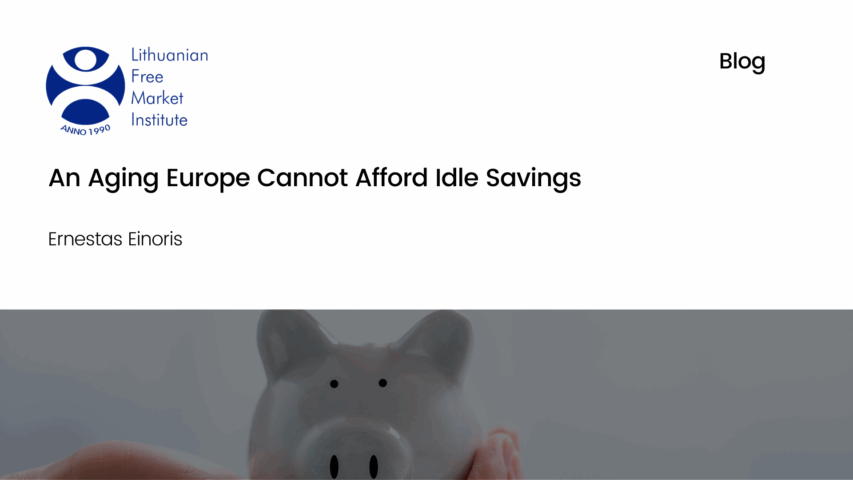An Aging Europe Cannot Afford Idle Savings

An Aging Europe Cannot Afford Idle Savings
Ernestas Einoris // 10 September 2025
A paradoxical situation has developed in the European Union. The population is ageing, the economy is stagnating, and at the same time huge amounts of people's savings are lying unused in banks. The European Commission estimates that as much as 31% of Europeans' savings are sitting in bank accounts, while Americans use their money much more efficiently and keep three times less money under the mattress or in bank deposits. The secret lies in the underdeveloped second and third pillar pension systems, which would allow people's savings to be directed into investments, turning them into a dignified retirement.
Retirement systems based on savings and investment allow residents to accumulate pensions whose size does not depend on the ratio of workers to pensioners in society. The funds set aside each month for retirement are invested and generate a return, while also nourishing the economy by injecting capital. Meanwhile, social insurance systems based on current contributions pay out funds to pensioners immediately, thus this money does not participate in value creation. As society ages, it becomes increasingly difficult for the state to sustain such a pension model – as the number of pensioners grows and the number of workers declines, the burden on workers increases. It is no coincidence that pensions are estimated to have been the main factor in the growth of public sector spending over the last twenty years. As a result, less money is left for other important areas such as defence, education, and health care.
Pensions socialised in the state insurance system became popular in Europe partly for historical reasons. World wars and hyperinflation between the wars burned through Europeans' savings, in some countries, they were even confiscated to finance the current needs of the time. These circumstances undermined public confidence in long-term saving. As a result, after World War II, most European countries designed systems based exclusively on current contributions – saving and investing were seen as too risky. It is important to recognise that for a while this system worked perfectly – the number of working-age people on the devastated continent grew rapidly, the recovering economy increased wages, and pensions grew steadily along with them. However, in recent decades, this trend has been reversed – the number of pensioners is growing swiftly, and state budgets are struggling to collect enough contributions to pay pensions. Despite this, European countries are reluctant to make changes that would strengthen long-term pension system sustainability.
Greater incentives to participate in the funded pension system would contribute not only to a dignified lifestyle in old age, but also to kick-starting the faltering economic engine. The European Commission, led by Ursula von der Leyen, has noted that the Community's economy is losing the competitive battle with the US and other countries, and that the lag is particularly acute in the new technology sector – both artificial intelligence, which has become a necessary everyday tool, and autonomous cars, which can drive themselves to the passenger's desired destination, are being developed not in Europe but far across the ocean.
Underdeveloped funded pension systems result in a shortage of capital for companies – billions of Europeans' savings sitting idle in banks could become productive capital used for innovation and product development in Europe. It is estimated that the continent's economy loses around €350 billion in investment every year due to unused savings. The situation in the US is somewhat different, and a particularly illustrative example of this is the growth of technology giant Apple, which was partly financed by pension fund capital. US pensioners can rejoice – Apple's success has contributed to higher pensions for them.
If Europe manages to wake up from its slumber and properly exploit the potential of businesses and the capital of its citizens, the economic returns would help offset the negative demographic changes. Action seems to have begun – a few months ago, the European Commission announced its strategy for a "savings and investment union." The plans include preparing recommendations for member states on how to increase the number of participants in pension accumulation, better inform them about the financial benefits of pension accumulation, and review the regulation of pension funds.
However, changing course will not be easy, as some countries are enthusiastically swimming against the tide – more than a decade ago, Hungary, Slovakia, Bulgaria, and Poland allowed pension accumulation to be discontinued in one form or another and withdrew from the pension accumulation system. Estonia took this step a couple of years ago, and Lithuania is planning to do so next year. However, if the EU's strategy does not remain mere words but becomes real action, it will be possible to untie these bags of unused savings – and ensure both a vibrant economy and a dignified retirement.
This blog post was first published by the Lithuanian Free Market Institute in Lithuanian.
Ernestas Einoris is an expert at the Lithuanian Free Market Institute.
EPICENTER publications and contributions from our member think tanks are designed to promote the discussion of economic issues and the role of markets in solving economic and social problems. As with all EPICENTER publications, the views expressed here are those of the author and not EPICENTER or its member think tanks (which have no corporate view).



